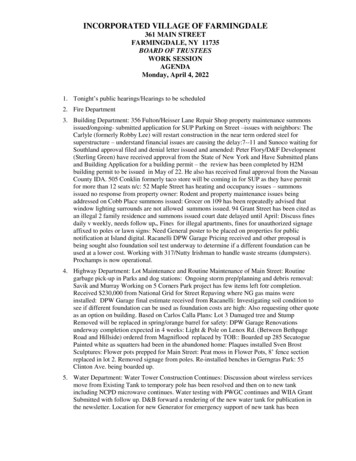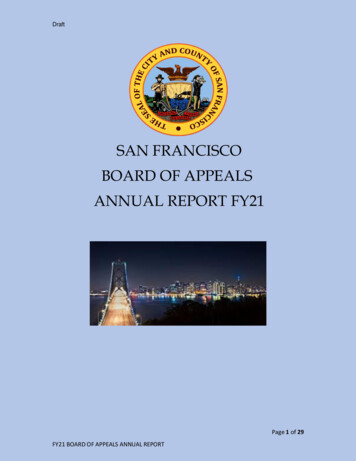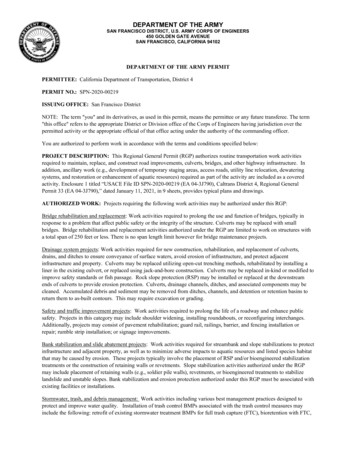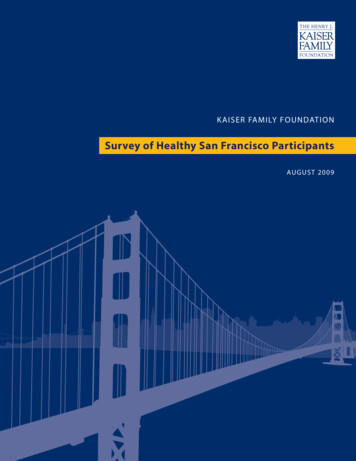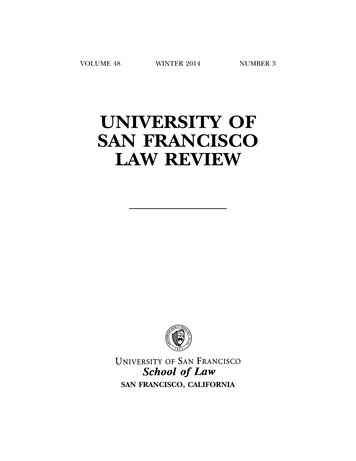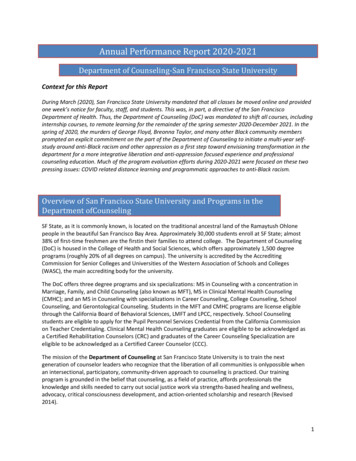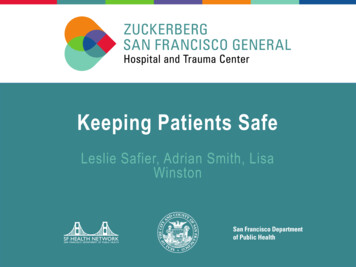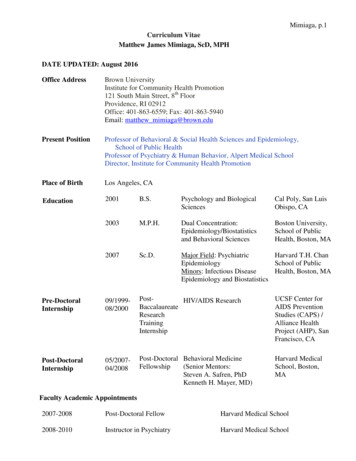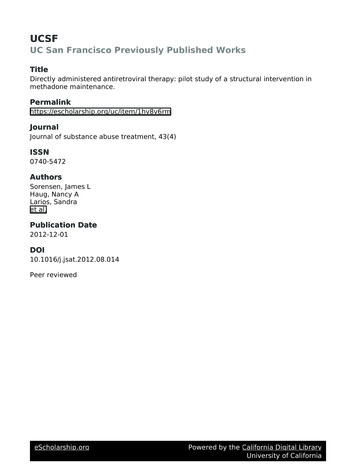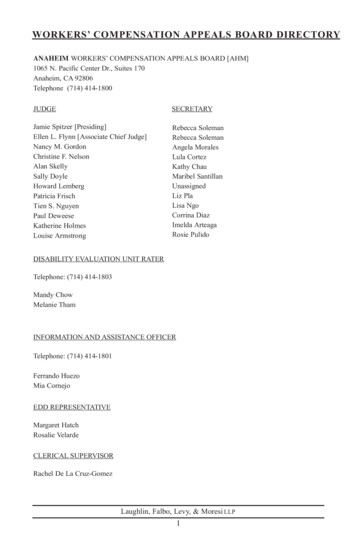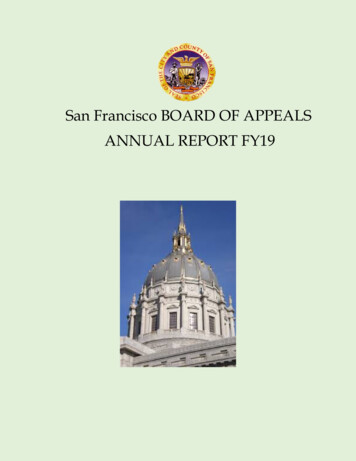
Transcription
San Francisco BOARD OF APPEALSANNUAL REPORT FY19
MISSIONTo provide an efficient, fair and expeditious public hearing and decisionmaking process before an impartial panel.o Created in 1932 under the San Francisco Chartero Quasi-judicial bodyo Provides the final administrative review for a wide range of Citydeterminationso Appeals may be taken on decisions to grant, deny, suspend,revoke or modify permits, licenses, and other use entitlementsissued by most of the departments, Commissions and otherentities of the City and County of San Francisco
BOARD MEETINGS Meetings Hourso Open to the public and broadcast on the City’s governmenttelevision channel and website1o Held on most Wednesdays starting at 5:00 p.m. in City Hallo Conducted in accordance with the Rules of the Board of Appealso Closed-captioned in the hearing room and on TVMeeting agendas, minutes, and appellants’ and respondents’ briefs andother materials associated with the cases heard are posted on theBoard’s /ViewPublisher.php?view id 62www.sfgov.org/boaFY19 Board of Appeals Annual Report 2
BOARD MEMBERSHIPThe five-member Board is comprised of three members appointed by theMayor and two by the President of the Board of Supervisors. Allappointments are to staggered, four-year terms and require approval bythe Board of Supervisors.Commissioner Appointing AuthorityAppointment DateTermExpiresOctober 19, 2004July 1, 2020April 2, 2015July 1, 2020Ann Lazarus MayorJuly 25, 2012July 1, 2022Darryl Honda MayorDecember 4, 2012July 1, 2020October 30, 2018July 1, 2022President Frank Fung3 MayorVice President Rick Swig Board of SupervisorsRachael Tanner Board of Supervisors(L to R) President Frank Fung, Commissioner Ann Lazarus, Vice President Rick Swig, CommissionerRachael Tanner and Commissioner Darryl Honda.3President Fung resigned on May 1, 2019 as he was appointed by Mayor Breed to the PlanningCommission. Commissioner Swig became Acting President for the remainder of FY19. Mayor Breedappointed Commissioner Eduardo Santacana on July 31, 2019 to complete Frank Fung’s term.President Fung also served on the Board of Appeals from January 1986 to June 1988.FY19 Board of Appeals Annual Report 3
APPEAL EXPERIENCE212 matters were on the Board’s docket during the year:o 161 new matters filed 146 appeals 11 rehearing requests (RRs) 4 jurisdiction requests (JRs)o 51 pending or continued matters carried forward from prioryears (48 appeals, 1 RR and 2 JRs)FY19 Docket24%2%5%69%AppealsNew RRsNew JRsHoldoverFY19 Board of Appeals Annual Report 4
102 matters were decided by the Board:o 91 appealso 9 rehearing requestso 2 jurisdiction requests110 matters were not heard:o 43 pending appealso 42 appeals withdrawno 7 appeals remained or were placed on Call of the Chairo 7 appeals were dismissed (the appeal was moot because a permitwas canceled or suspension released)o 3 RRs (2 withdrawn and 1 heard in FY20)o 4 JRs not heard (3 withdrawn and 1 heard in FY20)o 4 appeals rejectedStatus of the 212 matters on docket120100806040200HeardPendingAppeals Dismissed Call of theWithdrawnChairRRs notheardJRs notheardRejectedFY19 Board of Appeals Annual Report 5
Appeal Volume146 new appealsBelow the ten-year average of 177 appeals per fiscal yearTen-year Average sFY15FY16FY17FY18FY19Average10-year average 177 appealsChanges in appeal volume from year to year can be attributed to a varietyof causes, such as fluctuations in the health of the City’s economy, newpermitting legislation or business trends that trigger a spike or drop in aparticular type of appeal, and specific enforcement efforts by the City thatresult in appealable penalties.FY19 Board of Appeals Annual Report 6
Rehearing & Jurisdiction Requests VolumeRehearing Requests (RRs) ask the Board for a new hearing to reconsidera hearing decision. The Board may grant a Rehearing Request only upona showing that there is new evidence that could have affected the outcomeof the original hearing or to prevent manifest injustice.Jurisdiction Requests (JRs) ask the Board to allow an appeal to be filedlate on the basis that the City intentionally or inadvertently caused therequestor to be late in filing an appeal.11 new Rehearing Requests 4 new Jurisdiction RequestsRRs and JRs35302520151050FY10FY11FY12RRsFY13JRsFY14FY15RR AverageFY16FY17FY18FY19JR AverageThe volume of rehearing requests and jurisdiction requests has remainedrelatively low each year. The ten-year average for rehearing requests: 17 The ten-year average for jurisdiction requests: 17FY19 Board of Appeals Annual Report 7
Subject Matter66% of appeals filed were of land-use decisions made by theDepartment of Building Inspection (DBI), the Planning Department (PD)the Planning Commission (PC) and Zoning Administrator (ZA).Other permit appeals came from: San Francisco Public Works (SFPW): 33% Department of Public Health (DPH): 1% Arts Commission (AC): 1% Municipal Transportation Agency (MTA): 1%6050403020100FY19 Board of Appeals Annual Report 8
Typical land use cases involve: Building Permits (site and alteration permits) Accessory Dwelling Units Zoning Administrator Decisions:o Varianceso Letters of Determination regarding permitted useso Notices of Violations and Penalties Planning Commission ActionsFY19 Board of Appeals Annual Report 9
57 appeals filed were of decisions made jointly by DBI and thePlanning Department: 52 appeals protested the issuance of building permits; theseappeals are typically filed by individuals or groups of neighborsconcerned that proposed construction will negatively impact theirproperty or neighborhood 5 appeals protested the denial of building permitsAppeals of Joint DBI/Planning Decisions9%91%Issuance of Building PermitsDenial of Building PermitsJoseph Duffy, Senior Building Inspector, DBIFY19 Board of Appeals Annual Report 10
17 appeals filed were of decisions made solely by DBI: 16 appeals protested the issuance of alteration permits 1 appeal protested the denial of an alteration permitAppeals of DBI Decisions116Issuance of Building PermitDenail of Building PermitFY19 Board of Appeals Annual Report 11
21 appeals filed were of Zoning Adminstrator decisions: 7 appeals protested Letters of Determination 6 appeals protested the ZA’s Requests to Suspend or Revokebuilding permits 4 appeals protested the issuance of Variance decisions 3 appeals protested Notices of Violation and Penalty 1 protested the ZA’s issuance of a Rear Yard ModificationScott Sanchez, Acting Deputy Zoning Administrator, San Francisco PlanningDepartmentFY19 Board of Appeals Annual Report 12
Appeal of ZA Decisions5%19%29%33%14%VariancesLetters of DeterminationNotice of Violation and PenaltyZA Suspension/Revocation Requests (building permits)Rear Yard ModificationFY19 Board of Appeals Annual Report 13
2 appeals were of Planning Commission decisions:o Section 329 Large Project AuthorizationsFY19 Board of Appeals Annual Report 14
Special Note Regarding Improved Notice to Tenants RegardingProposed Accessory Dwelling Units (ADUs)In FY19, the Board heard testimony from residential tenants who statedthat they never received notice of proposed conversions of buildingspaces into ADUs. These tenants were either directly (through theremoval or reduction of housing services such as a garage, laundry, orstorage space) or indirectly (by the nature of construction work)adversely affected. Consequently, on May 8, 2019, the Board ofAppeals adopted a Resolution encouraging the establishment of noticerequirements to all tenants of a residential building when permits areissued to add ADUs.Subsequent to the adoption of this Resolution, the Board of Supervisorspassed Ordinance No. 116-19 which amended the City’s implementationof the state ADU program in order to bring it into compliance with recentchanges in state law. The state ADU program applies to ADUs withinsingle-family homes or in accessory buildings on the same lot as thesingle-family home. The ordinance added notice requirements for thistype of ADU, including posting at the property, written notice to tenantsof the home, and online posting.There is a separate ordinance still pending at the Board of Supervisorsthat may add notice requirements for the addition of ADUs in multi-unitbuildings.FY19 Board of Appeals Annual Report 15
Typical Cases from San FranciscoPublic Works (SFPW)SFPW Bureau of Street Use and Mapping:Wireless Facility PermitsMobileFacilityPermitsFoodFY19 Board of Appeals Annual Report 16
SFPW Bureau of Urban Forestry: Tree Removal Permits39 appeals filed were of decisions made by San Francisco PublicWorks: 25 appeals protested the issuance of Wireless Box Permits for theinstallation of cellphone equipment in the public right-of-way 12 appeals protested the issuance or denial of orders or permitsrelated to tree removal 1 appeal protested the issuance of a Street Improvement Permit 1 appeal protested a Sidewalk Table and Chairs Permit No new appeals of Mobile Food Truck Permits in FY19Appeals from SFPW Decisions2%3%31%64%Wireless Box PermitsTree Removal Orders/PermitsStreet Improvement PermitSidewalk Table & Chairs PermitChris Buck, Urban Forester, SFPW-BUFFY19 Board of Appeals Annual Report 17
Developments Related to Wireless Facility PermitsNew Legislation Regarding Wireless Facility Permits Article 25 of the San Francisco Public Works Code sets forth the localregulations governing wireless facility permits.On June 30, 2019, in Ordinance No. 19-019, the Board of Supervisors amendedArticle 25 and made significant changes (effective September 9, 2019):oCarriers are no longer required to get a permit from Public Works to installwireless facilities on SFPUC and SFMTA poles. The use of these poleswill be through a license which is not appealable to the Board of Appeals.oPublic Works will only issue permits for facilities on PG&E poles. Appealsof these permits must be made directly to the Board of Appeals as PublicWorks is no longer required to hold a public hearing for these wirelesspermits.Public works, the Planning Department and the Recreation and ParksDepartment must work together to develop objective standards that satisfyArticle 25’s aesthetic criteria.It is not yet clear how these legislative changes will affect the volume ofhearings at the Board of Appeals. Although there will no longer be appealsrelated to city-owned poles, appeals of permits issued to PG&E poles will bemade directly to the Board of Appeals, which could result in an increasedvolume of hearings.Request by the Board of Appeals to the Department ofPublic Health regarding the Health Effects and Regulation ofWireless Communications Networks 4Under Article 25, the Department of Public Health must approve a wireless servicefacility site permit prior to issuance. More specifically, DPH must determine, in part,whether the facility is within the FCC guidelines which set forth the safe limit forexposure to radio frequency radiation.In FY19, the Board frequently heard from concerned appellants that the FCCGuidelines, adopted in 1996, were outdated given the significant advancements intechnology that have been made over the last two decades. These appellantsexpressed concerns about the health effects of the wireless facilities.Given the foregoing, the Board formally requested that DPH review and update itsMemorandum, drafted by Dr. Rajiv Bhatia4 and dated June 14, 2010, regarding thehealth effects and regulation of wireless communication networks.Dr. Bhatia was the Director of Occupational and Environmental Health at DPH.FY19 Board of Appeals Annual Report 18
It is anticipated that DPH will provide an update to the Board by December 2019.Appeals from Determinations of Other City Departments:Department of Public Health 4 appeals related to Tobacco Sales Establishment Permits (3denials and one suspension by DPH) 1 appeal of a suspension of a Permit to Operate a SwimmingPool/Spa 1 appeal related to the revocation of a Permit to Operate aRestaurant 1 appeal related to the denial of a Medical Cannabis DispensaryPermit (appeal withdrawn) 1 appeal related to the issuance of an order to an establishmentfor operating without a massage business permit (appeal rejectedfor lack of subject matter jurisdiction)Arts Commission 1 appeal regarding the revocation of a Street Artist CertificateSFMTA 1 appeal of a Memorandum Regarding Taxi Medallion Rules atSFO (Rejected for lack of subject matter jurisdiction)FY19 Board of Appeals Annual Report 19
Outcome: 91 Appeals DecidedGiven the supermajority vote required to grant an appeal, the Boardtypically denies more appeals than it grants.50 appeals were denied by vote resulting in the underlyingdepartmental decision being upheld33 appeals were granted with conditions by the Board: Theunderlying departmental decision was conditioned or modified insome way7 appeals were granted by the Board with the underlyingdepartmental decision completely overturned1 appeal was denied by default when the Board was unable to mustersufficient votes to pass a motion that would grant or deny the appeal(underlying departmental decision upheld by operation of law)Outcome 91 Appeals36%55%8%Denied by Vote1%Denied by DefaultGrantedGranted with ConditionsFY19 Board of Appeals Annual Report 20
Outcome: Rehearing & Jurisdiction Requests11 Rehearing Requests were on the Board’s docket in FY19:o 9 deniedo 2 withdrawnOutcome RRs18%82%DeniedWithdrawan5 Jurisdiction Requests were on the Board’s docket in FY19o 1 deniedo 1 grantedo 3 withdrawnFY19 Board of Appeals Annual Report 21
Outcome JRs20%20%60%DeniedWithdrawnGrantedFY19 Board of Appeals Annual Report 22
Geographic DistributionThe appeals heard by the Board during the year involve properties locatedin most of San Francisco’s neighborhoods. As is typical for the Board, thehighest concentration of appeals is seen in the northeast quadrant, andthe lowest is in the southern portion of the City.Geographic Distribution of Appeals Filed in FY19FY19 Board of Appeals Annual Report 23
Appeals Management System The Board Office replaced its outdated appeals managementsystem with a new system that runs on the Salesforce platform5 The developer built custom features to meet the needs of theBoard of Appeals Benefits of the new system:o Significantly improved reporting capabilities and efficiencies;provides more accurate data for the Annual Report andfacilitates information requests for public recordso All documents related to an appeal can be uploaded to onecentral locationo A user has the ability to add notes with date and time stampwhich helps the office keep track of issues related to anappealo Creates agendas and vote sheets and keeps track of allcases for the various calendars (the old system did not keeptrack of agendas or hearing dates and therefore was proneto human error because cases that were rescheduled orcontinued had to be manually moved)o Increased efficiencies create customer convenience One goal is to enable payments (including payments by creditcard) to be made on the internet or at kiosks/cashiers in the newPermit Center, thereby eliminating the need of Board staff tohandle payments (currently the Board office only accepts cash orcheck and must make weekly deposits to the Treasurer’s Office inCity Hall)5The previous appeals management system had to be replaced because it was no longer beingsupported by the Department of Technology.FY19 Board of Appeals Annual Report 24
PERFORMANCE MEASURESCity departments are required to report on specific statistical measures as a way ofassessing and documenting performance. The two measures unique to the Board lookat how long it takes the Board to decide cases and how quickly written decisions arepublished.o Measure One: Percentage of appeals that are decided within 75 days of filing (casesdecided in FY19).o The Board decided 91 appeals in FY19o The FY19 target was to decide 60% of the cases within 75 days of filing.o The Board exceeded this target by deciding 69% of the cases (63 cases)within 75 days of the appeal being filed.o With respect to the 28 cases that were decided more than 75 days after anappeal was filed: 10 were delayed due to an increase in appeal volume during aparticular time period 11 were delayed due to rescheduling requests by the parties Six were continued by the Board for additional information or to givethe parties an opportunity to negotiate a settlement One was delayed due to putting the matter on the Call of the Chairbecause the case had unique circumstanceso If we excluded rescheduled cases, then 78% percent of the cases wouldhave been decided within 75 days of filingo Measure Two: How often written decisions are issued within 15 days of final Boardaction. The FY19 target was to issue 97% of the written decisions within 15 days offinal action. The Board issued 94% of the written decisions within 15 days of final action. For four out of the five cases that were issued more than 15 daysafter the final Board action, it was necessary to delay the decisionsbecause they had an associated appeal in which an appellantrequested a rehearing For the fifth appeal decided more than 15 days after the finalaction, the decision was issued within 16 days of final actionFY19 Board of Appeals Annual Report 25
Performance Measure: Target v. Actual120%100%80%60%40%20%0%PM 1 TargetPM 1 ActualCases Decided w/in 75 daysPM 2 TargetPM 2 ActualDecisions issued w/in 15 daysFY19 Board of Appeals Annual Report 26
BUDGETREVENUE OVERVIEWThe Board has two sources of revenue:(1) Surcharges placed on permits which are designed to generate therevenue needed to cover operating expenses (95% of the budget)a. Surcharges are collected on new and renewed permits.b. The rates are based on the percentage of cases originatingfrom each underlying department and anticipated permitapplication volume. These rates are analyzed annually andadjusted if needed.(2) Filing fees which are collected when new appeals are filed (5% ofthe budget)PROJECTED REVENUE 1,072,300 was the projected revenue budget:o 1,026,263 in projected surcharge revenue collected by permitissuing departments on new permit applicationso 46,037 in projected filing fee revenue collected by the Boardwhen new appeals are filedACTUAL REVENUE 972,093 in actual revenue was collected:o 933,956 in surchargeso 38,137 in filing fees- 100,207 shortfall from projected revenue (% less than projected)FY19 Board of Appeals Annual Report 27
EXPENDITURES OVERVIEWPROJECTED EXPENDITURES 1,072,300ACTUAL EXPENDITURES 1,030,439 was spent by the BoardExpendituresFund 10000Fund 10020(Reserve used fornew ,439Savings79,861Actual38,000Total Expenditures1,030,439FY19 Board of Appeals Annual Report 28
Breakdown of Expenditures:o 757,584 for salaries and fringe benefitso 190,191 for the services of other City departments, such as theCity Attorney, Department of Technology, SFGovTV, and RealEstate (rent)o 38,466 for specialized services such as: neighborhoodnotification, data production, interpreters, and infrastructure costssuch as, photocopier, telephones, and postageo 38,000 partial payment for new Appeal Management Systemo 6,198 for materials and suppliesReserve Account Given that actual revenue did not meet projections andactual expenditures exceeded actual revenue, theshortfall was covered by a transfer from the ReserveAccountFY19 Use of ReserveActual RevenueActual ExpendituresShortfall which necessitateduse of the reserve 972,093 1,030,439( 58,346)FY19 Board of Appeals Annual Report 29
Surcharges The surcharges imposed on appealable permits areintended to recover costs for the Board’s expenses Given the surplus in the Reserve Account, some surchargefees were lowered in FY18 with the intent to rebalance theBoard’s cost recovery A reduction in the Reserve Account is consistent with ourgoal of rebalancing our cost recovery After conducting an analysis, the Controller’s Office onlyauthorized minor increases in certain surcharge amountsfor FY20.SurchargesDepartmentSurcharge Surcharge Surcharge SurchargeFY17FY18FY19FY20Planning 25.00 18.50 18.50 19.00DBI 25.00 18.50 18.50 19.00DPH 52.00 43.00 43.00 44.50SFMTA (TAXI) 7.00 2.00 2.00 2.00PUBLIC WORKS 6.50 6.50 6.50 6.50SFPD 26.50 6.00 6.00 6.00 4.00 4.00 4.00ENTERTAINMENT 4.00COMMISSIONFY19 Board of Appeals Annual Report 30
LITIGATIONParties dissatisfied with a Board determination may seek further review and relief incourt. Set forth below is a description of the lawsuits that were filed, pending orresolved during the year, in which the Board is named as a party.New: Cort v. CCSFPetitioner filed this case alleging the City improperly suspended or revoked permits at2551 Mission Street. The property is an old theater that has been empty since 1987.The owner obtained permits to convert the property to a gym with a climbingwall. When concrete from the façade fell on the Mission Street sidewalk, the ownerremoved the remaining loose concrete, exceeding the scope of the issued permits. TheZoning Administrator requested that the Department of Building Inspection revoke thebuilding permits, and that decision was appealed to and upheld by the Board. Theparties have met to discuss the administrative record, and alternatives to litigation.New: San Francisco Care Center v. CCSFThe petitioners in this case allege that the City improperly denied a building permit. In2000, petitioners entered into a development agreement with the City to build anassisted living facility with 112 units. In 2007 after the project was complete, petitionersmade unpermitted improvements to remove several assisted living units and create twomaster administrator suites. The Department of Building Inspection issued a Notice ofViolation in 2017. Petitioners sought a permit to legalize the work. The PlanningCommission disapproved the permit, and the Board of Appeals upheld thatdetermination in 2018. The petitioners have requested that the City prepare theadministrative record. On February 2, 2019, the City demanded that petitioners providea deposit for the preparation of the record. Petitioners have not responded.New: Michael J. Turon v. SF Board of Appeals et al.Petitioner sought a permit from the Department of Building Inspection to document thelegal use of 2722-2724 Folsom Street as a two-unit residential building. TheDepartment of Building Inspection denied the permit, on the basis that the buildingcontains three residential units. The Board upheld the denial of the permit. Petitionerfiled a writ on February 4, 2019 seeking to overturn the denial of the permit.FY19 Board of Appeals Annual Report 31
New: Frear Schmid v. CCSFThe Historic Preservation Commission granted a Certificate of Appropriateness findingthe Arts Commission’s proposal to remove a statue entitled “Early Days” from thePioneer Monument, located in the Fulton Street right of way between the Main Libraryand the Asian Art Museum, complied with the Planning Code, the Secretary of Interior’sStandards for Rehabilitation, and the General Plan. Petitioner appealed the Certificateof Appropriateness to the Board, and the Board denied the appeal and upheld theHistoric Preservation Commission’s decision. Petitioner filed suit challenging the City’sdecision to remove the statue on a variety of grounds, including challenging the Board’sdecision on the appeal of the Certificate of Appropriateness. The Superior Courtsustained the City’s demurrer to the complaint, finding that the Board did not act inexcess of its jurisdiction nor did it abuse its discretion in affirming the Certificate ofAppropriateness. The Superior Court entered judgment against Petitioner, andPetitioner filed an appeal, which is currently pending before the Court of Appeal.Pending: Marc A. Bruno, et al. v. City and County of San Francisco, et al.This is a petition challenging CEQA categorical exemption for a building permitauthorizing façade restoration and garage removal at 20 Nobles Alley in NorthBeach. The pro per petitioner alleges that the City used an incorrect CEQA baselineand failed to adequately analyze impacts to historic resources. The petitioner alsoalleges violations of the Sunshine Ordinance and conflict-of-interest rules. Thepetitioner elected to prepare the administrative record. After missing numerousstipulated and Court-ordered deadlines to provide the complete record to the City, thepetitioner has provided the City with funds to complete preparation of the record. OnSeptember 18, 2019, the Court ruled that the petitioner failed to state any valid causesof action, but gave the petitioner thirty days to amend the petition to support the CEQAcause of action only. The City will wait to complete the administrative record until thepetitioner has amended the petition.Contest Promotions, LLC v. City & County of San Francisco, et al.PENDING. In July 2014, the Board of Supervisors approved a settlement of ContestPromotions’ previous lawsuit challenging the constitutionality of Planning Code section602.3, which defines onsite business signs. The Board of Supervisors then amendedsection 602.3, which clarified that Contest Promotions’ signs in San Francisco do notqualify as business signs, but are prohibited general advertising signs. On January 20,2016, the Board upheld the Planning Department’s denial of 35 sign permit applications.Contest Promotions contends that San Francisco breached the settlement agreementFY19 Board of Appeals Annual Report 32
when it amended section 602.3 and when it denied Contest Promotions’ sign permitapplications. Federal and state courts have dismissed all of Contest Promotionsconstitutional claims against the amended section 602.3. On March 26, 2019, theSuperior Court granted summary judgment to San Francisco on Contest Promotions’remaining claims for breach of contract. Contest Promotions has appealed the merits tothe Court of Appeal. The parties agreed that San Francisco’s compensable attorneys’fees through entry of judgment was 500,000.Pending: Robert E. Gonzales v. San Francisco Board of AppealsA lawsuit was filed in Superior Court by an adjacent property owner challenging the Board’sAugust 26, 2015 decision to uphold a permit to erect a building at 333 Pennsylvania Avenue.On January 6, 2016, the Court denied the petitioner’s motion for immediate relief, stating itfailed to establish that the Planning Code or Residential Design Guidelines were violated. Thepetitioner has made no further effort to pursue this matter. After the case has been pending 5years, San Francisco will move to dismiss the case for failure to prosecute.Pending: 1049 Market Street, LLC v. City & County of San Francisco, et al.Six lawsuits were filed by the owners of a six-story building challenging, among otherthings, the Board’s April 8, 2015 decision to grant an appeal filed by residential tenantsprotesting the Zoning Administrator’s (ZA) Release of Suspension Request on a permitto convert live-work units to commercial space, and the Board’s April 5, 2017 decisionsrelated to the revocation of that permit. One case was filed in federal court and theothers were filed in state court.The state cases assert claims under CEQA, a vested rights theory and severalconstitutional claims. The federal case focuses on federal constitutional claims.Because the state and federal suits challenge the same conduct and seek the samedamages, the federal court agreed to have the state court resolve the issues of localland use law before it determines whether any federal constitutional issues remain. Onthis basis, the federal lawsuit has been stayed pending the outcome in state court.In April 2016, the City won the first of the five state court cases on all issues except thejurisdictional issue relating to whether the Board had properly considered the validity ofthe permit. The court remanded the matter to the Board for reconsideration of whetherthe ZA erred or abused his discretion in determining that the property’s principallypermitted use as an office had not been abandoned, but left the Board the option toapply recently adopted legislation requiring a Conditional Use Authorization. The Cityhas since prevailed in the appeal of this case, and that ruling is now final.Another of the state court cases, which challenges on CEQA grounds the permanentzoning controls adopted by the Board of Supervisors, is before the Court of Appeal butFY19 Board of Appeals Annual Report 33
has not yet briefed. In August 2017, another of the state court cases was rejected basedon the petitioner’s failure to timely serve. The two most recently filed cases, stemmingfrom the Board’s 2017 decisions, are still before the trial court.The parties have reached a settlement and the execution of the settlement is ongoing.Resolved Sullivan v. CCSFThis was a petition filed in FY18 challenging a building permit which authorized anexterior stairwell at 407A 30th Street. The petitioners alleged that the stairwell wouldencroach on petitioners’ properties at 1716 and 1720 Sanchez Street. The petitionersand real party reached a settlement and the petitioner dismissed the matter withprejudice on August 14, 2019.FY19 Board of Appeals Annual Report 34
FY19 Board of Appeals Annual Report 8. Subject Matter . 66% of appeals filed were of land-use decisions made by the Department of Building Inspection (DBI), the Planning Department (PD) the Planning Commission (PC) and Zoning Administrator (ZA). Other permit appeals came from: San Francisco Public Works (SFPW): 33%
